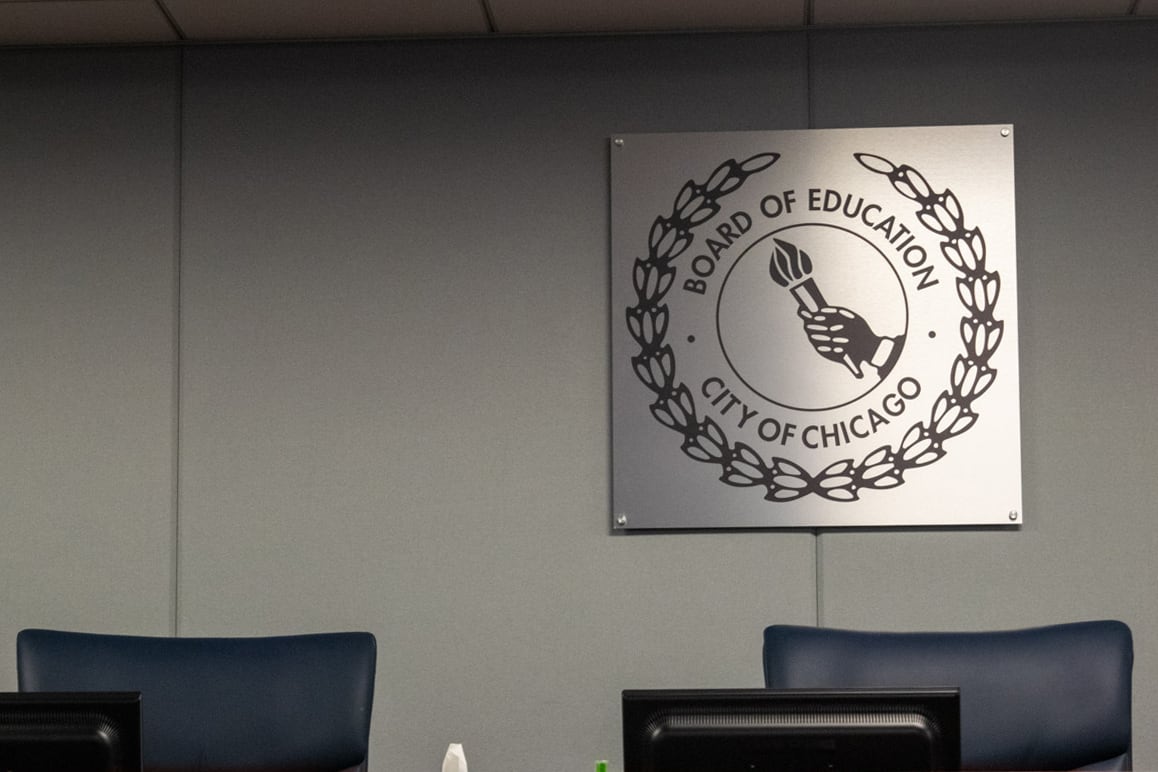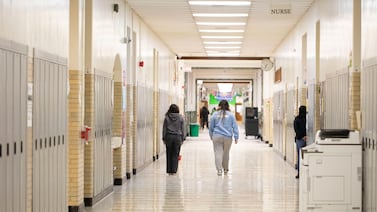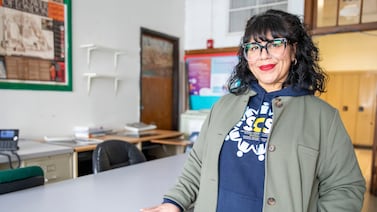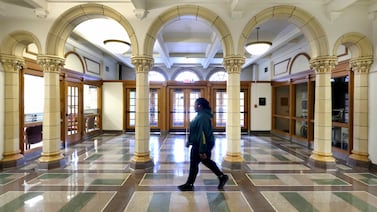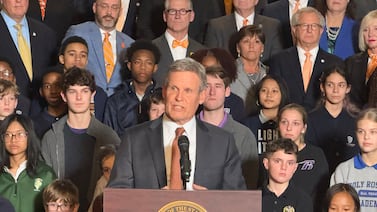Sign up for Chalkbeat Chicago’s free daily newsletter to keep up with the latest education news.
The entire seven-member Chicago Board of Education will resign in the coming weeks after months of tension between Mayor Brandon Johnson and Chicago Public Schools CEO Pedro Martinez.
The resignations pave the way for Johnson to appoint new board members who could then carry out his wishes, including potentially firing Martinez. Johnson’s office said late Friday he will announce new appointments on Monday at 10:30 a.m.
Word of the resignations comes more than a week after the school board took no action to remove Martinez and about a month before the city’s first school board elections, which will create for the first time a hybrid board of 10 elected members and 11 appointed by the mayor. In three decades of mayoral control, no Chicago mayor has replaced all of their hand-picked members so quickly. Johnson hand-picked six of seven members last July.
The upheaval is also happening amid contract negotiations with Johnson’s former employer the Chicago Teachers Union.
In a joint statement Friday, Johnson and the current appointed school board announced all current members would “transition from service” later this month.
“None of the members leaving the current Board planned to continue onto the hybrid Board, and none are running for election. With the unprecedented increase in Board membership, transitioning new members now will allow them time to orient and gain critical experience prior to welcoming additional elected and appointed members in 2025,” the statement read.
Johnson said this week that he never discusses personnel issues in public. But he told reporters Wednesday, “I was elected to fight for the people of the city and whoever is in the way, get out of it.”
In an interview with Chalkbeat, Jen Johnson, deputy mayor for education, youth, and human services, said the mayor’s office “did not ask for resignations.”
“We knew that none of these board members were running [for election] or going to stay, and so we collaborated to ensure that there was a shepherding, a passing of the torch, as we approach this new board,” Johnson said, adding that all seven board members signed on to the statement the mayor’s office sent to the press.
Earlier this month, the mayor asked Martinez to step down — which he publicly later denied doing. Nonetheless, Martinez refused to resign and the school board has declined so far to fire him.
Board members have declined to comment publicly on Martinez’s clash with Brandon Johnson, but the board has in recent months backed Martinez in a couple of decisions that defied the mayor’s wishes. That includes adopting this year’s budget, as well as declining Johnson’s request for CPS to take out a short-term loan to cover some upcoming costs.
The board members stepping down are Board President Jianan Shi, Elizabeth Todd-Breland, who was appointed by former Mayor Lori Lightfoot, Mary Fahey Hughes, Tanya Woods, Mariela Estrada, Michelle Morales, and Rudy Lozano Jr.
Shi and Todd-Breland declined to comment further Friday. The other members have not returned emails or calls asking for comment on the resignation rumors this week.
The resignations will pave the way for Johnson to appoint new people to fill the vacancies on the board, who could then vote to approve a short-term loan and fire Martinez. The next school board meeting is Oct. 16, one of few remaining scheduled meetings before the new partially-elected, 21-member school board is sworn in on Jan. 15, 2025.
“The board certainly will have the same authority, to evaluate the CEO against the objectives, and they will, you know, have to certainly tackle the incompleteness of the budget,” Deputy Mayor Johnson said.
Johnson did not directly answer when asked if it is the mayor’s hope that the new board will fire Martinez and approve a loan.
The mayor “will work with this new board just as he did with the current board to ensure we are protecting investments in our schools and that we are not cutting and using the truly chaotic solutions of past administrations, which harmed students in communities for generations,” she said.
In a statement, CPS CEO Martinez commended the board members “for their steadfast dedication to ensuring greater equity in our system, emphasizing our collective responsibility to improve the quality of education for those who are furthest from opportunity.”
If the mayor’s intention is to install a new board in order to fire Martinez, it would “be a group that has never evaluated [Martinez], has never worked with him,” according to a source familiar with the situation who was not authorized to speak with the press. “They don’t know any of his work, they haven’t been part of any of these conversations.”
That source also noted that new board members typically have an orientation, which could be difficult to wedge in before the board’s first meeting.
In order to conduct business, the school board must have a quorum, which board rules define as “a majority of the full membership of the Board of Education then serving.”
Deputy Mayor Johnson declined to specify the exact date of departure for each current board member, calling the latter a “personal decision” for each person.
A CPS central office staffer, who was not authorized to speak with the press, said the board “doesn’t want to undermine the mayor publicly” and feels board members were pressured to leave for not adhering to the mayor’s wishes. Another source familiar with the situation, also not authorized to speak with the media, questioned the official explanation.
“The mayor’s office will try to spin this as a transition,” the source said. “There is no credible explanation for why seven people would all leave a month or two ahead of time to facilitate a transition.”
The mood in the CPS central office was “like a funeral home” Friday as news of the resignations broke, according to the central office staffer, who said many people were sad to see the board departures.
“You could tell they really care about what’s going on at the district,” the staffer said, adding that they have worked with multiple CPS boards. “They have a sense of responsibility that I think I haven’t seen in the past.”
Multiple board members had been in serious discussions to resign as of at least Sunday, three sources told Chalkbeat.
As rumors of resignations floated earlier this week, Gov. J.B. Pritzker said he hoped the school board would not resign before new members are elected. Friday morning, former Chicago school board member and once interim-CPS CEO Jesse Ruiz put out a statement thanking current board members and urging them to “stay the course.”
“Despite all the pressures I know you all are under, I truly hope you continue to provide the steady leadership, governance and oversight that is critical for our public institutions to operate in the best interest of ALL its stakeholders,” Ruiz wrote on X, the social media platform formerly known as Twitter.
The school board shakeup likely won’t have an immediate effect on schools, students, and educators, said Jeffery Henig, professor emeritus of politics and education at Columbia University’s Teachers College, who has studied mayoral control of school boards.
The resignations “will create a potential embarrassment” for the mayor, but also give Johnson a chance to “step in strongly” and make swift decisions that he thinks are necessary, Henig said.
The turmoil could, however, create long-term problems for the new board, which may be tasked with replacing Martinez, hiring a permanent replacement, or addressing the issue of borrowing to cover costs, he said.
“This dramatic gesture by the current board could set into motion enough turmoil and public positioning and open vying for leadership in one faction [of the school board] versus another, that it would make it harder for the new board to set an even course at the beginning,” Henig said.
Some candidates running for school board in the November election began issuing statements.
Kate Doyle, a candidate in District 2, said she was “disappointed to see leaders step away” at a critical time and that if elected, she would “work to ensure that decisions are made transparently and with the long-term success of our students in mind.”
Tensions between Martinez, Johnson building for months
In its year-plus tenure, the Johnson-appointed Board of Education has pursued and approved policies that line up ideologically with the mayor. That includes making a commitment to prioritize neighborhood schools, moving away from student-based budgeting for schools, and barring police officers from school campuses.
Martinez and his administration worked in tandem with the board to develop and implement those changes. But the school board has had some frustrations with his performance, WBEZ reported last week. According to documents related to his annual evaluation, board members felt blindsided or unprepared in certain circumstances. Still, CPS told WBEZ that the board and Martinez “have worked collaboratively throughout our tenure to have open dialogue, fostering a respectful and professional relationship.”
“It’s true that the board has been frustrated with Pedro along the way,” said the source familiar with the situation. “But I do think that, in my knowledge of the situation, there has been this relentless pressure to fire Pedro for cause and do it quickly, and the board is not comfortable doing that.”
According to Martinez’s contract, the board would need to provide six months notice before firing him without cause. If the board fired him for just cause, such as criminal activity, he would have to leave immediately. Martinez could sue the district if he believes he was wrongfully terminated.
At the heart of the tension between Johnson, his school board, and Martinez is the district’s budget, which faced a half-billion-dollar deficit before CPS made cuts to close it. That deficit existed largely because billions of federal COVID dollars that the district used to beef up staffing and invest in new programs, such as tutoring, expired this week.
The district’s $9.9 billion budget approved in August did not set aside dollars for the new teachers contract, which it is currently negotiating. It is not unusual for the school district to amend its budget once a contract deal has been reached. WBEZ recently reported that the district has outlined several options, including the “last resort” option of furloughs and layoffs.
Johnson criticized the budget plan, which included the same amount of funding for schools but resulted in other cuts, including of support staff who CPS said will be reassigned or paid for the rest of the year.
The district also did not include a $175 million pension payment for non-teaching staff that CPS began paying in 2020 when Johnson’s predecessor, Lori Lightfoot, was in office. Johnson opposed that cost shift before he became mayor, but has now asked CPS to continue paying it as he works to close a $223 million deficit in the city’s current budget and a nearly $1 billion deficit projected for 2025.
Johnson was expected to deliver his city budget proposal in a speech to City Council on Oct. 16, but earlier this week the mayor’s office announced Johnson would deliver his budget on Oct. 30, a week after the school board is scheduled to meet.
Over the summer, Johnson asked CPS to take out a short-term loan to help pay for the cost of the pension payment and the added expenses of contracts for the teachers and principals unions. Martinez and the board refused, in fear that taking on such a loan would saddle the district with high-interest rates and deepen its looming deficit for years to come.
The board’s departure so close to the election will likely turn up heat on school board candidates, said Henig, the Columbia professor who has studied mayoral control.
“If the candidates haven’t been forced to address this, there’s gonna be a lot of pressure on them to address this,” Henig said.
Union negotiations turn up heat on Martinez
The conflict is compounded by ongoing contract negotiations between the district and the Chicago Teachers Union, where Johnson worked as an organizer before his foray into politics. The union’s wide-ranging proposal package asks for 9% raises, more staffing, and more support for students, but the district has said its financial challenges remain – and less than 10% of the CTU proposals could create a $4 billion deficit for the district by the 2029-30 school year..
The union further turned up the heat on school district officials after saying it obtained a list of potential co-locations between 140 schools. The district, Martinez, and the Board of Education have said they have no plans to close schools. In letters to staff and families earlier this month, Martinez said the list was created as part of its analysis for the five-year strategic plan, and that it led district leaders and the board to affirm that they did not want to close schools.
The union’s House of Delegates recently passed a vote of no-confidence in Martinez.
Under state law, no school closures can happen in Chicago until Jan. 15, 2025. After the union’s claims over the past couple of weeks, the now-outgoing board passed a resolution Thursday, which Martinez prompted, that calls for no school closures until 2027.
Reema Amin is a reporter covering Chicago Public Schools. Contact Reema at ramin@chalkbeat.org.

